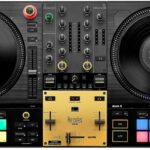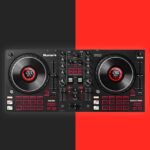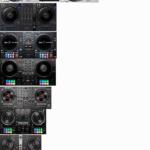Discover the best DJ controllers for every budget in 2025—from affordable starter models to professional flagship setups. This detailed editorial review covers features, pros, and cons to help you select the perfect gear for your DJ journey.
Best DJ Gear for Every Budget: The Top Controllers of 2025 Ranked
Choosing DJ equipment in 2025 is all about balancing features and budget. Whether you’re a beginner, enthusiast, or pro, finding the right controller to match your skill level and bank account makes all the difference. This editorial guide ranks the best DJ controllers across four budget categories, examining their software, hardware, and performance pros and cons.
Under $150: Kickstarting Your DJ Journey
1. Numark Party Mix II ($135)
The Numark Party Mix II delivers all the essentials for bedroom mixing: 2-channel mixer, gain control, built-in sound card, and performance pads. It supports multiple software options (Serato DJ Lite, Algoriddim DJ Pro, Virtual DJ), and its built-in light show and attachable speaker add excitement.
Pros:
- Budget-friendly price
- Versatile software compatibility
- Light show and integrated speaker
Cons:
- Only 4 performance pads per deck
- Simplified feature set
2. Pioneer DDJ-200 ($150)
Tiny but mighty, the DDJ-200 features eight performance pads, a 3-band EQ, large tempo faders, and Bluetooth support for mobile app integration. Its greatest strength is Rekordbox DJ compatibility, prepping future club DJs with professional software.
Pros:
- Good Rekordbox integration
- Mobile and Bluetooth connectivity
Cons:
- No built-in sound card (requires laptop/phone output)
- Lacks essential buttons (browse, load, trim)
3. Hercules DJ Inpulse 200 ($130)
Hercules offers intuitive beatmatching and mixing tutorials as well as solid hardware. Like Numark’s mix, it’s limited to four pads but provides full DJ software.
Pros:
- Teaching-focused features
- All essential controls included
Cons:
- Limited pad count
- Basic build quality
Under $300: The Value Sweet Spot
1. Pioneer DDJ-400 ($250)
Pioneer’s DDJ-400 stands out with full Rekordbox support and a layout matching the club-standard CDJ/DJM setups. This makes it the ideal choice for DJs aspiring to play live on professional rigs.
Pros:
- Full-featured Rekordbox software
- Club-standard layout
- 5/5 rating for value and workflow
Cons:
- Lacks balanced outputs (PL output)
- Build quality is only average
2. Hercules DJ Inpulse 500 ($299)
The Inpulse 500 ups the ante with RGB pads, better build quality, more outputs, and advanced teaching tools. Its full DJUCED software and pop-out stand provide flexibility and pro-ready features.
Pros:
- Teaching system and advanced controls
- Robust build and RGB pads
- 5/5 rating for value, innovation, and versatility
Cons:
- Ships with Serato DJ Lite by default
- Lack of super-advanced pro features
3. Pioneer DDJ-SB3 ($249)
A Serato DJ Lite controller offering creative pad modes (including Slicer), it’s reliable with an easy-to-use layout. Limited only by its basic software (unless you upgrade to Serato DJ Pro).
Pros:
- 2-channel mixing and 8 performance pads
- Creative pad features
Cons:
- Lite software restricts advanced features
- Pad scratch mode considered a gimmick
4. Numark Mixtrack Platinum FX
Its standout feature is the large jog wheels and built-in display, making mixing more intuitive. Paddle effects add fun but its performance for scratching is limited.
Under $1,000: Intermediate to Semi-Pro
1. Denon DJ Prime GO ($999)
This standalone controller works without a laptop, featuring wireless streaming, battery power, a 7” touchscreen, and comprehensive input/output. Perfect for portable pro setups.
Pros:
- Portable, all-in-one design
- Wireless and battery powered
- 5/5 rating for innovation and flexibility
Cons:
- Small jog wheels
- Limited pad count
2. Pioneer DDJ-800 ($799)
Pioneer’s most underrated semi-pro controller features LCD jog displays, hardware effects, RGB pads, and Rekordbox DJ. Lighter and more portable than the DDJ-1000, it offers pro features for less.
Pros:
- Club layout and hardware effects
- Comprehensive IO and portability
- 5/5 rating for pro features and workflow
Cons:
- No standalone function (requires laptop)
3. Pioneer DDJ-FLX6 ($599)
FLX6 provides 4-deck mixing, big jogs, and innovative Merge FX and Jog Cutter modes. Its only downside is the limited output options.
Under $2,000: Top-Tier Professional Controllers
1. Pioneer DDJ-1000/SRT
With full-size pro jog wheels, mixer section cloned from DJM-900NXS2, and display-equipped pads, these controllers are peak performance in club and festival settings.
Pros:
- Unmatched club-standard features
- Full IO and robust build
- 5/5 rating for pro workflow and reliability
Cons:
- Requires computer (not standalone)
- High price
2. Denon DJ Prime 4 ($1,899)
A true standalone powerhouse, featuring a touch display, 4-deck mixing, massive IO, and Serato DJ Pro compatibility. Slightly heavy for portable DJs.
Pros:
- Standalone operation
- 4 decks and touch display
- 5/5 rating for flexibility
Cons:
- Size and weight
3. Rane One ($1,499)
A niche controller for turntablists, with motorized platters and Serato integration. Not for everyone, but a dream for scratch DJs.
Final Thoughts
Every budget level offers the potential for creativity and skill building. Start cheap, learn the fundamentals, and upgrade as your music career and gigs demand more features. From the Inpulse 200 to the DDJ-1000, every controller on this list is designed to get your journey started or take your craft to new heights. Consider your preferred software (Rekordbox, Serato, Traktor, Virtual DJ), layout style, and unique workflow before making a choice.
Which DJ controller are you saving up for in 2025? Comment below with your top pick and why!










